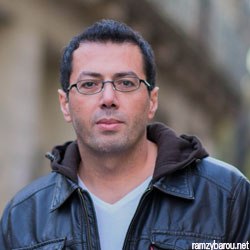On 14 October, Germany’s Foreign Minister, Annalena Baerbock, who continues to speak tirelessly against Russia and its war with Ukraine, went as far as providing a roundabout justification for the Israeli genocide in Gaza. “When Hamas terrorists hide behind people, behind schools … civilian places lose their protected status because terrorists abuse it,” Baerbock said in her address to the German parliament. Her logic is a carbon copy of that of Israeli Prime Minister, Benjamin Netanyahu, and his extremist ministers.
The truth is that there is no credible proof that Palestinian fighters “hide behind civilians”, but there is an abundance of well-documented evidence that Israel uses civilians as human shields. This does not matter to the German government, which seemed unbothered by the fact that Israel is carrying out a genocide using, in part, German arms. Indeed, Germany is one of the countries that continues to supply Israel with weapons, despite the fact that the International Court of Justice (ICJ) and the International Criminal Court (ICC) are investigating Israel and Israeli leaders for genocide and extermination of the population of Gaza.
Unfortunately, but also unsurprisingly, Germany remains the biggest supporter of Israel within the European community. Germany, of course, is not alone. All western governments, led by Israel’s supreme benefactor, the United States, have, throughout the years and until now, continued to provide tangible and political support for Israel. They also do their utmost to shield Israel against any accountability, even though the genocide in Gaza continues to gain momentum, reaching the point of the systematic extermination of northern Gaza.
No common position on Israel in Europe
While countries like Spain and Ireland have taken advanced positions in criticism of Israel, others are still finding ways to delay any meaningful stance that could send a message to Tel Aviv that the world is fed up with its horrific crimes against the Palestinian people. Last May, Spain’s Labour Minister, who also serves the role of the deputy Prime Minister, Yolanda Diaz, dubbed Israeli crimes in Gaza a genocide, ending her statement with the declaration that “from the river to the sea, Palestine will be free.”
This was followed on 6 June with Spain requesting to join South Africa’s case at the ICJ, accusing Israel of genocide. Other European countries have done the same, including Belgium and Ireland, demonstrating that European states still command a degree of independence in foreign policy and are able to behave ethically and in defiance of Washington or the collective position of Brussels. Aside from the models of Germany and Spain, there are those who are vying for a middle position and equal distance between those who are committing genocide and the victims of the genocide. This category includes France and Italy.
Both Paris and Rome were and, in fact, remain strong supporters of Israel and its “right to defend itself”, a right that they continue to bestow upon Tel Aviv despite its 57 years of Occupation of Palestine and even during the ongoing genocide. At the start of the Israeli war on Gaza, French President, Emmanuel Macron, and Italian Prime Minister, Giorgia Meloni rushed to offer limitless support to Netanyahu, again reaffirming Israel’s right to defend itself, thus approving the genocide of the Palestinian people. They also offered and delivered material, intelligence and political support to Israel in the ongoing war.
Israel started to get in the way of France and Italy
Due to the fact that the world’s public opinion turned against Israel, Netanyahu’s failure to achieve “total victory” in Gaza, and his desperate attempt to crush Hezbollah in Lebanon, both France and Italy have begun to question their blind support. For some European leaders, Israel has become a liability, and Netanyahu’s military adventurism is now infringing upon their own geopolitical claims in the Middle East.
The above assertion should explain Macron’s call on 6 October to halt arms deliveries to Israel. France continues to see Lebanon as a “French affair”, and an Israeli invasion of the country is a direct challenge to French influence. Meloni, on the other hand, while fully supportive of the Gaza genocide, found Israel’s targeting of the United Nations Force in Lebanon (UNIFIL) a red line that must not be crossed, due to the fact that, according to the Italian Institute for International Political Studies (ISPI), Italy is “the largest European contributor to UNIFIL’s forces.”
To speak about a fundamental shift in the European position regarding the Israeli crimes in Gaza and Lebanon would be, at best, premature and, at worst, a fallacy. However, a change is underway, led by Spain, Ireland, Norway, Belgium and others and, to some degree, felt in Paris as well.
Whether the slow shift among Israel’s Western supporters and protectors will become a permanent change in foreign policy is a question for future discussion. For now, even the most advanced European positions are failing to change the course of the war. Only the region’s own dynamics, the resilience and the resistance of the Palestinian and Lebanese peoples are capable of defeating Netanyahu’s strategy.
-Ramzy Baroud is a journalist and the Editor of the Palestine Chronicle. He is the author of five books. His latest is ‘These Chains Will Be Broken: Palestinian Stories of Struggle and Defiance in Israeli Prisons’. Baroud is a Non-resident Senior Research Fellow at the Center for Islam and Global Affairs (CIGA) and also at the Afro-Middle East Center (AMEC).













